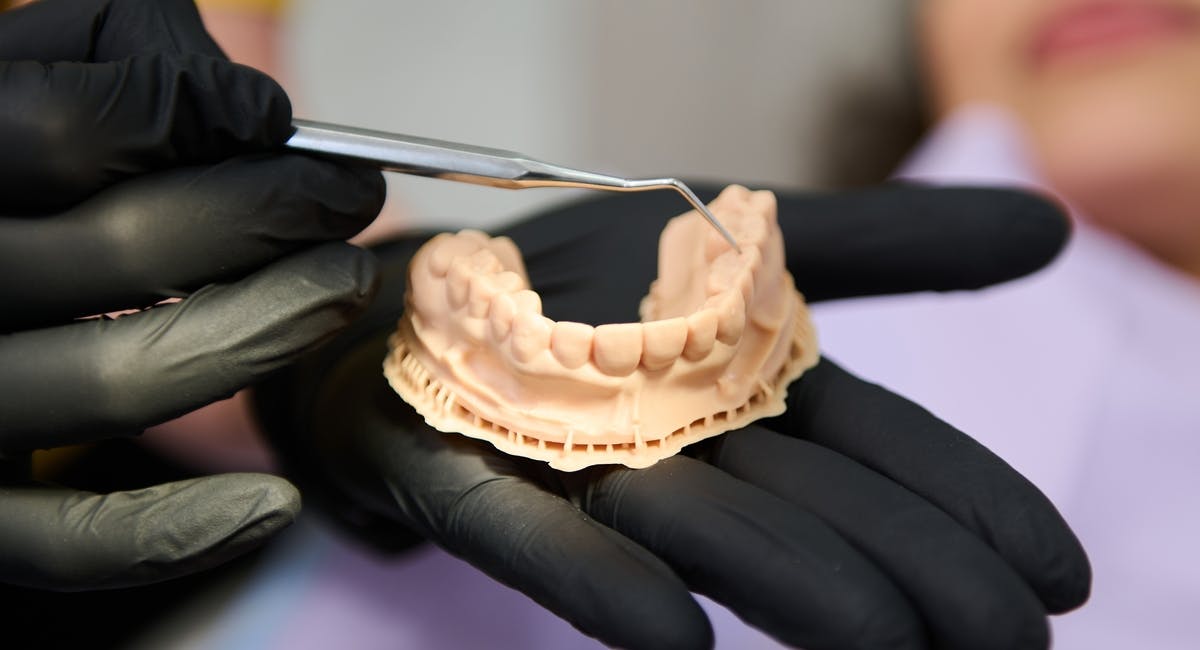Frequently Asked Questions About Full Dentures
General questions
-
1. What are dentures?
Dentures are artificial teeth and gums that replace your natural teeth when they’re lost or removed. Your dentist creates the dentures, customizing them to your specific needs. They may recommend a particular type of denture based on the number of teeth that need to be replaced and where in the mouth the denture will need to go.
-
2. Types of dentures
From full dentures to partials and implants, there are several types of dentures on the market—each made from different materials and serving different purposes. It’s important to discuss the benefits of each with your dentist to find out which appliance would be most suitable. You can find out more about the different types of dentures available here.
-
3. How to tell if my denture fits properly?
Knowing what’s right when it comes to how your dentures fit can be tricky. It can take a week to four weeks to get used to your new fitting but there are things to look out for in case your dentures need adjusting. If you have persistent soreness in yours gums or loose movement in your mouth, you may want to check with your dentist that your dentures fit properly.
-
4. How long do dentures last?
-
5. What to expect when getting dentures?
Once your dentures have been fitted, it may feel strange to have them in your mouth. For the first one or two days, your dentures might feel heavy and you should expect some changes to the way you eat and speak. However, this is all completely normal and your tongue, mouth, and facial muscles will soon adapt.
-
6. What to ask the dentist before a tooth extraction
Whilst it may seem like a daunting procedure, being aware of what to expect can ease your mind. Being clear on the day's schedule is important as well as asking questions about anaesthetic types, ways to ease anxiety and what to consider when leaving the surgery. Find our full list of questions to ask your dentist before tooth extraction here.
-
7. What will my first week with dentures be like?
Experiences will vary from person to person but understanding how to adjust to your new dentures during your first week is important. As a new denture wearer, you may find changes with the way you eat and speak as well as some initial discomfort. However, these hurdles can be overcome with effective meal planning and practising talking with your dentures at home.
-
8. What denture adhesive would you recommend for strongest hold and food seal?
Our new adhesive, Poligrip Power Hold + Seal, offers our strongest hold* and 5x protective food barrier** against sealing out food particles. It is suitable for partial or full dentures wearers.
*within Poligrip range
**Protects against 5x more food particles vs. no denture adhesive -
9. When can I use denture adhesive after extractions?
After an extraction please consult with your dentist before using a denture adhesive. Prior to using a denture adhesive we recommend you always follow the product label instructions. If you are unsure when to start using a denture adhesive, please ask your dentist for advice.
For a denture adhesive that offers our strongest hold and food seal, try Poligrip Power Hold + Seal.
-
10. How to apply denture adhesive to partials?
When first using denture adhesive, apply a small amount to your partial denture. Apply more if needed. Too much denture adhesive may cause oozing; apply less next time if this occurs. It may take a few tries to find the right amount for your partial denture. Apply once a day. Please contact your dentist if you need to apply more than once a day. Refer to individual packaging instructions before use.
When applying denture adhesive to a partial denture, first clean and dry your partial denture. Apply 2 short strips, not too close to the partial denture edges. Then rinse mouth before inserting your partial denture. Press partial denture into place, hold firmly, and bite down for a few seconds to secure hold. Before product use we recommend you always follow the product label instructions.
Care
-
1. How to clean dentures?
Brushing and soaking your dentures daily helps prevent permanent stains from developing and is key to maintaining good oral health. Be sure to use specially formulated denture cleansing tablets to clean them rather than toothpaste and bleach, which can scratch the denture surface and cause discoloration.
-
2. Types of denture cleansers?
There are numerous cleaning solutions available to clean your dentures. From soaking solutions to creams and cleansers designed specifically for smokers. Explore our range of cleansers here.
-
3. How to care for dentures
Taking care of your dentures the right way is crucial for comfort and durability. Establishing a daily cleaning routine is essential for good denture care as well as understanding how to store your appliance correctly and staying on top of gum discomfort. Visit our denture care hub here.
-
4. Can I sleep with dentures?
Your dentist may ask you to wear your dentures all day and night. Whilst this may be uncomfortable, it can help you identify whether there are problems with how your dentures fit. After this initial assessment period, it’s generally not advisable to sleep with your dentures in, unless you've been specifically asked to.
-
5. Should I use 1 tablet per denture (upper and lower) or 1 tablet per all the dentures I have?
-
6. Can I use more or less Polident tablets than recommended?
-
7. How often can I use a denture cleanser?
-
8. Can I reuse the Polident tablet solution several times?
Eating
-
1. How to eat with dentures?
-
2. What foods can I eat with dentures?
Being a denture wearer doesn't mean you have to stop eating the foods you enjoy. Plan ahead and you can create easy to eat all day meal plans that incorporate food types that are easy to chew and don't irritate your gums. From scrambled eggs at breakfast, fresh fruit and yogurts to snack on and chilli and fish for dinner, there are lots of things you can incorporate within your meal plans.
Speech
-
1. Will dentures change the way I talk?
-
2. How to talk with dentures
New denture wearers may find it difficult to pronounce certain sounds, particularly "F" and "S" sounds. You might also struggle speaking at a normal volume and may experience your dentures shifting in your mouth. However, there are ways to manage these speech issues as you adapt to your new dental appliance, including practicing with tongue twisters and using a denture adhesive.
Relationships
-
1. How to tell others I have dentures?
Telling partners, family and friends that you have dentures can be daunting but there are ways to take the stress out of this process. Starting slowly and opening up to your closest friends or family members is always a good place to start and, as time goes on, you should be able to become more confident living with your dentures and gradually tell more people.
-
2. How to date with dentures
Dating with dentures can be nerve wracking but there are plenty of things you can do to prepare and boost your confidence in advance. Practising talking with your partial dentures can help you get over any hurdles you may have with your speech as well as making sure you pick the right foods and remembering to smile!
Self Esteem
-
1. How can dentures impact my self-esteem?
Getting dentures can sometimes affect your day-to-day confidence but there are ways to boost your confidence during this new chapter of your life. It's important to know you're not alone on this journey and dentures are made to fit as naturally as possible and shouldn't change the shape of your face or mouth. Adjusting to them can take time, but you can overcome self-esteem issues by learning to eat and speak with dentures at home and establishing an effective cleaning routine.





